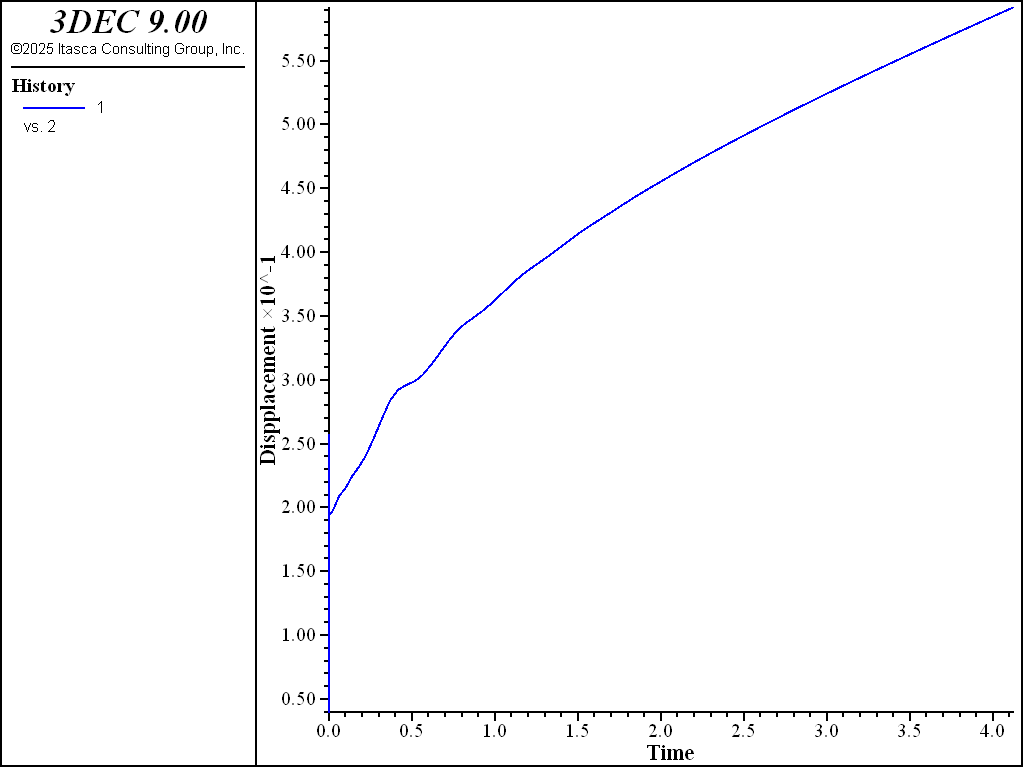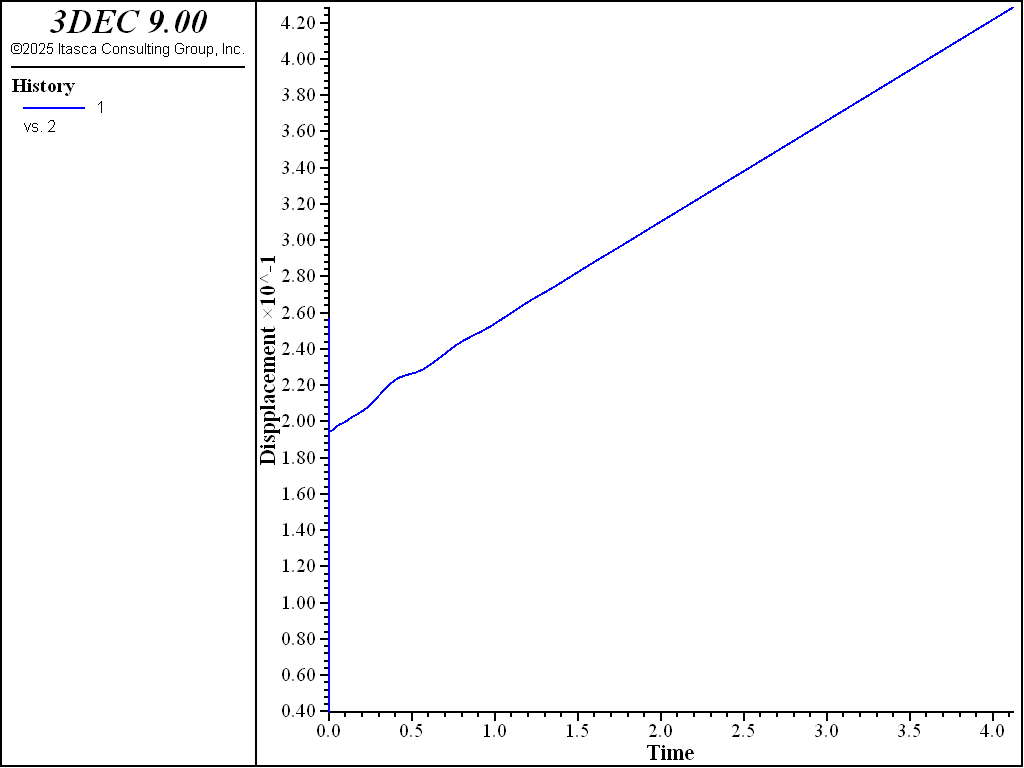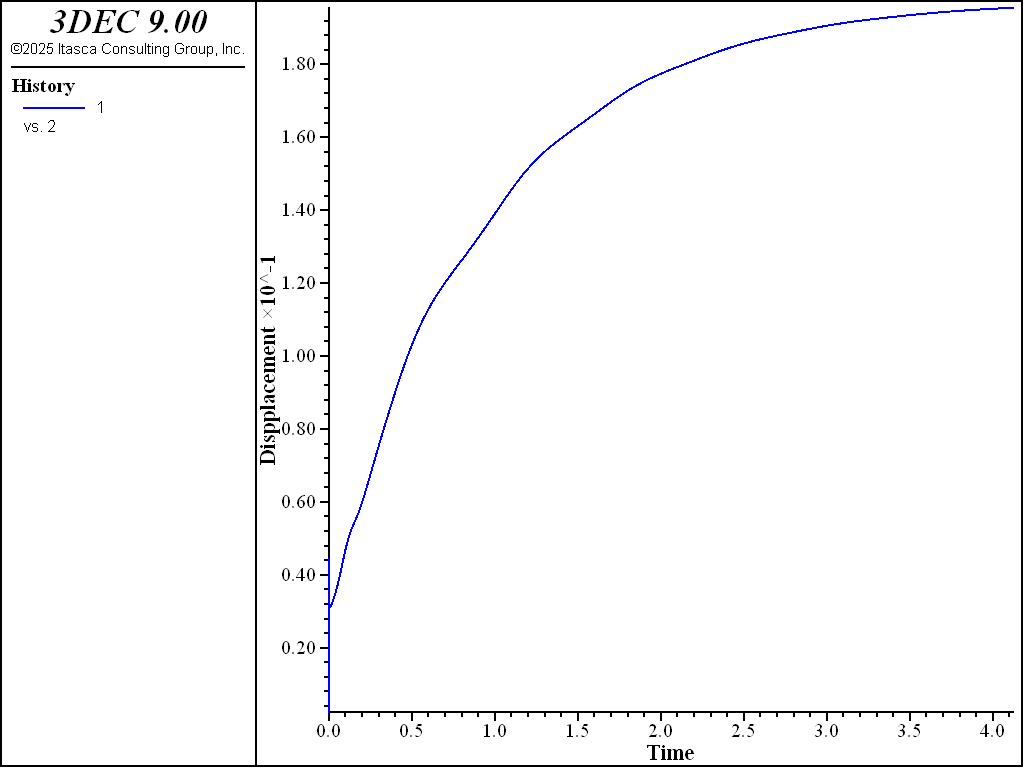Loaded Block - Burgers Model
Note
To view this project in 3DEC, use the menu command . The project’s main data files are shown at the end of this example.
This example simulates a square block of material loaded at the top surface with a constant stress. The block is composed of material that obeys the Burgers model, in which all elements are “active” (i.e., both moduli have similar values, and both viscosities have similar values). In this case, we expect both Kelvin and Maxwell components to influence the response
The test was performed with the Burgers viscoelastic model.
Figure 1 shows the displacement response of the top of the block versus creep time. There is an instantaneous elastic response caused by the Maxwell spring, followed by continuous creep in the long-term caused by the Maxwell viscosity. The curvature in the short-term is due to the relaxation of the Kelvin component.
If the viscosity-kelvin property is set to 1000 instead of 1, the response resembles that of a Maxwell model alone, since the Kelvin section of the Burgers model is made almost rigid by the use of a large viscosity (compared to the Maxwell viscosity). Figure 2 shows the response. This is similar to the response that would be obtained with model Maxwell, using similar properties: a shear modulus of 1 unit and a viscosity of 3 units.
If the viscosity-maxwell property is set to 1e10 instead of 3, and shear-maxwell is set to 50 insteaqd of 1, the response resembles that of a Kelvin model alone, since the Maxwell section of the Burgers model is made almost rigid by the use of a large viscosity and a large modulus. Note that the modulus is not made arbitrarily large because the “static” convergence would be poor. Figure 3 shows the response: the displacement history exhibits almost no initial jump (since the elastic modulus of the Maxwell section is high), and there is no long-term creep, which is characteristic of the Kelvin model.

Figure 1: Vertical displacement versus time, for the Burgers model.

Figure 2: Vertical displacement versus time, for Maxwell section only active.

Figure 3: Vertical displacement versus time, for Kelvin section only active.
Data Files
LoadedBlockBurgers.dat
model new
; file: LoadedBlockBurgers.dat
; tests of Burgers model
model configure creep
block create brick 0 5 0 1 0 5
block zone generate edgelength 5
model large-strain off
block zone cmodel assign burgers
block face apply stress 0 0 -.1 0 0 0 range position-z 5
block gridpoint apply velocity-z 0 range position-z 0
block history displacement-z position 2 0 5
model history creep time-total
model save 'load_block_common'
===================================================
;
model restore 'load_block_common'
model title 'test of Burgers viscoelastic model'
block zone property density 1 bulk 2 shear-kelvin 1 shear-maxwell 1 ...
viscosity-kelvin 1 viscosity-maxwell 3
model creep off
model cycle 500
model creep on
block gridpoint initialize velocity 0 0 0
block initialize velocity 0 0 0
model creep timestep starting .001
model creep timestep fix .001
model cycle 200
model creep timestep starting .005
model creep timestep fix .005
model cycle 800
model save 'load_block_creep_burger'
====================================================
;
model restore 'load_block_common'
model title 'test of Maxwell viscoelastic model'
block zone property density 1 bulk 2 shear-kelvin 1 shear-maxwell 1 ...
viscosity-kelvin 1000 viscosity-maxwell 3
model creep off
model cycle 500
model creep on
block gridpoint initialize velocity 0 0 0
block initialize velocity 0 0 0
model creep timestep starting .001
model creep timestep fix .001
model cycle 200
model creep timestep starting .005
model creep timestep fix .005
model cycle 800
model save 'load_block_creep_maxwell'
===================================================
;
model restore 'load_block_common'
model title 'test of Kelvin viscoelastic model'
block zone property density 1 bulk 2 shear-kelvin 1 shear-maxwell 50 ...
viscosity-kelvin 1 viscosity-maxwell 1e10
model creep off
model cycle 500
model creep on
block gridpoint initialize velocity 0 0 0
block initialize velocity 0 0 0
model creep timestep starting .001
model creep timestep fix .001
model cycle 200
model creep timestep starting .005
model creep timestep fix .005
model cycle 800
model save 'load_block_creep_kelvin'
program return
;
| Was this helpful? ... | Itasca Software © 2024, Itasca | Updated: Nov 12, 2025 |
